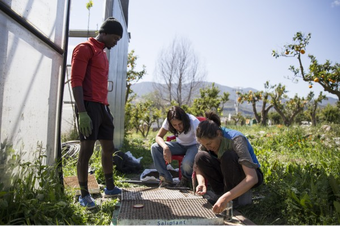As the ecological emergency deepens and with our democracy in crisis, this timely programme of events considers 'power' in terms of energy and resources as well as asking: What is our role as citizens and artists to hold power to account? How can we contribute to systemic change, find and employ our own power, and create collaborative solutions? Or in other words, how can we think about the future of making in order to survive and thrive?
Peoples’ Bureau in partnership with 198 Contemporary Arts and Learning are co-organising a two-day event in collaboration with Land in Our Names (LION), Lancashire’s Anti-Fracking Nanas, The Alternative London Alternative Photography Collective and artists Alexis Calvas, Helen Brewer, Hannah Fletcher, Catherine Long, and Jane Lawson.
Over the weekend, we will gather as artists, environmental protesters, land reparation activists, decolonial community organisers and academics to activate the space. We will take a practical, conceptual and theoretical look at re-skilling, sustainable and collaborative practice, material use, ancestral knowledge, and system changes. Through building, crafting, workshopping and conversing together, we will consider what are the materials and skills needed for resilient future of living.
For a full programme please see here
About 198, People's Bureau, Anti-Fracking Nanas and LION
People's Bureau is an artist led space (and network) of exchange in skills and needs, It was set up in 2014 and run from a dedicated shopping cart in the Elephant & Castle shopping centre.
198 Contemporary Arts and Learning is a visual arts organisation based in Brixton which boldly pushes the boundaries of creative practice while giving voice to under-represented creative individuals, communities and cultures.
Anti-Fracking Nanas are a group of compassionate individuals from all walks of life, fighting to protect our communities from the harmful effects of fracking.
Land In Our Names (LION) addresses access to land as instrumental to the various oppressions faced by black communities in England. They believe a reparative land justice is fundamental in solving issues around food insecurity, wellbeing, and widespread disconnection from nature.

